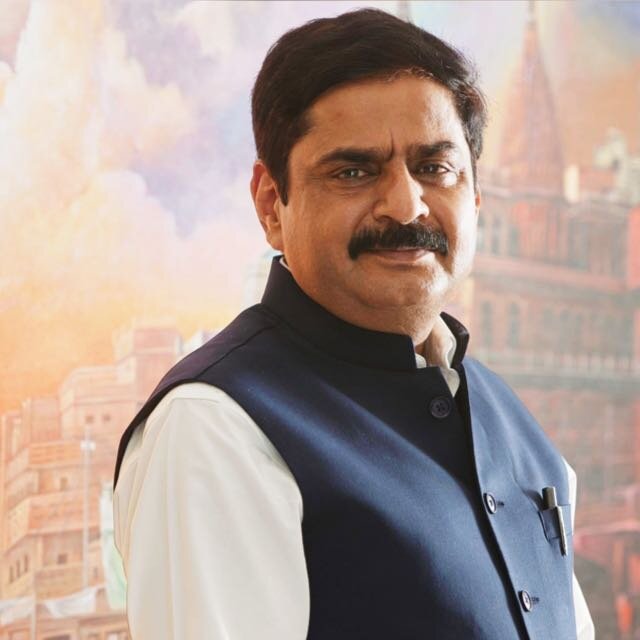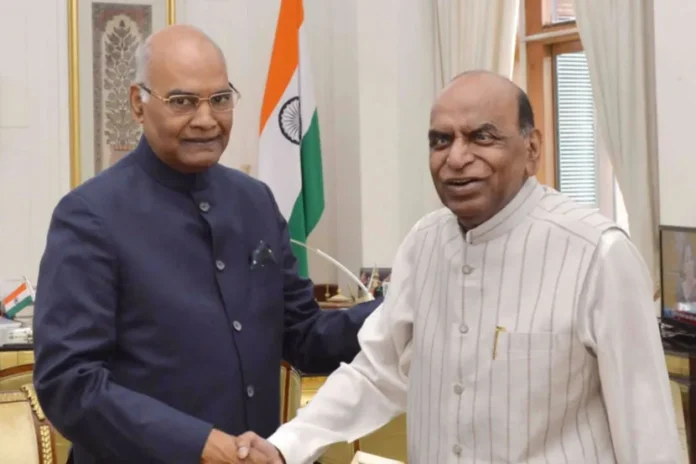DPT had loyal and loving friends in almost every political party, because he never turned his back on his friends

Jitendra Kumar Tiwari
D P Tripathi, who was fondly called as DPT, had an allrounder personality. He was an extraordinary innovative and inspirational mass-class leader. He was a laureate of Himalayan heights, whose heart was always throbbing for poetry. Though he was a round the clock politician, but he was an amazing poetic imagination of politics.
Tripathi was an extraordinary man in every sense of the term. His head was in politics but his heart was in literature, especially poetry. He had a photographic memory and scanned pages rather than reading them. This was when he suffered from a very serious visual infirmity since his early childhood. But it was not only his formidable memory but also sharp intellect that sustained him throughout his difficult life.
Though always lean and thin, he had great courage that flowed from mental and intellectual strength. He fought against cancer with the same determination as he had fought the Emergency, when he had to spend nearly 18 months in jail. A lesser man would have given up. Tripathi had loyal and loving friends in almost every political party, because he never turned his back on his friends.
Though he was my Chacha (uncle), but always behaved me like his friend. I must be one of the very few people who was very close to his heart. In front of others or in private conversation, he always called me by my domestic nick name Munna. He has no dearth of friends. People from every walks of life were free to meet him at anytime and he too was used to be very happy to serve them. One of his friend Kuldeep Kumar once told me, ‘When we were young students at Jawaharlal Nehru University, he would often fondly call me Kulanov and I would return his affection by calling him Triposky. Our friendship did not rest on political ideology. It was rooted in poetry. Devi Prasad Tripathi, who breathed his last at 9.50 am on January 2, 2020, was a poet in politics. I was almost his mirror image – a poet in journalism.’
Chacha was a person of extraordinary capabilities. During election time he could campaign for three days without sleeping a wink and could also sleep for three days without getting up. His political sense was so unusually sharp that after polling was over, leaders from the opposing camp would come to him to find out what would be the outcome. He could predict with precision which candidate would get how many votes. He was nearly always proven right. Apart from an alert political analyst, DPT was a master strategist. He was a stubborn democrat, who strongly believe in the basic essence of democracy: dialogue, debate and dissent. DP Tripathi was always of the opinion that democracy can’t survive without essence of dissent. It is because of this core belief, he strongly opposed the proclamation of Emergency.
IF THERE is a politician who could relate the most to India’s winter of simmering discontent and the surprise invocation of revolutionary Pakistani poet Faiz Ahmed Faiz as part of the confrontation with power, it is D P Tripathi. Rather, it was D P Tripathi. The sharp, witty and incisive Tripathi , who was once the face of the students’ resistance against Emergency in the mid-1970s, had a wonderful personality.
In a political era marked by charged debates and fraught, at times bitter, relations between leaders, Tripathi — DPT to his friends — was a class apart. He was the quintessential old-school politician who cultivated and nurtured warm personal relations with leaders across the political spectrum. From the CPI(M) to Congress and then to NCP, and a brief association with former Prime Minister Chandra Shekhar in between, he switched parties, surprising even his friends, in his over four-decade political life, but remained firmly committed to left of the centre ideology. Tripathi loved poetry, especially Faiz’s writings, and literature. His love for poetry and Faiz resulted in a book ‘Celebrating Faiz’.
When former prime minister Indira Gandhi declared Emergency in 1975, Devi Prasad Tripathi was the president of the students’ union at Jawaharlal Nehru University. “It was he who stood up to the ruling dispensation and said they needed to take students’ protests more seriously,” says Raghvendra Dubey Bhau, a journalist and close friend of Tripathi. Soon after, Tripathi was thrown into jail with the likes of former finance minister Arun Jaitley. But his commitment to democratic ideals never left him.
In 2006, as the democracy movement took shape in Nepal, Tripathi was part of the Nepal Solidarity Committee, a delegation of Indian politicians that visited the county, along with the CPI’s Sitaram Yechury, the CPM’s D. Raja and the late socialist thinker and activist Surender Mohan.
Soon after, Tripathi was thrown into jail with the likes of former finance minister Arun Jaitley. But his commitment to democratic ideals never left him. “I still remember that he gave the keynote address,” D. Raja tells the author. “He told them, you are fighting against your king. We have brought with us democratic Raja (king), a pun on my name.”
A former aide of Rajiv Gandhi who later left the Congress to help launch the NCP, a lover of Faiz Ahmed Faiz’s poetry, Tripathi donned many hats and was known to be very articulate and a forceful orator.
From SFI to Congress to NCP
Tripathi’s political career spanned over four decades. He started as a student politician in JNU where he won the president post while being associated with the Students Federation of India. But after Indira’s death, and with the rise of her son and former prime minister Rajiv Gandhi, it was the Congress that Tripathi chose to align with at the national level.
Love for Faiz and Ghalib’s poetry
It was in 1978 that Tripathi first met the author of “revolution and romance”, Faiz Ahmed Faiz. He had then recited a couplet to Faiz that he composed during Emergency — “Hai khabar ki koi khabar hi nahi hai, hai darr itna ki koi darr hi nahi hai (The news is that there is no news at all, so much is the fear that there is no fear at all)”.
“Faiz heard him and said, barkhurdaar, bahut acha likha hai, aur likha karo (This is very well written, you must write more),” Bhau said.
And that was the beginning of a long-standing friendship between the two. Tripathi’s love for literature is so well known that his friends can’t ever remember him mentioning just one favourite book. From Faiz to Raghuveer Sahai to John Keats to W.B. Yeats, he had a line of poetry for every occasion, they say. This, despite the fact that Tripathi suffered from a congenital defect that only allowed him to read when he brought the text really close to his eyes.
“He was extremely well-read and very active despite the limitations of his health,” says Bhau. Tripathi could seamlessly weave through the Upanishads with his knowledge of western philosophy. “I remember he would quote Sanskrit couplets in the Rajya Sabha,” says Bhau. “I don’t really understand Sanskrit but he was so articulate it was hard not to pay attention.”
For many, Tripathi was the ideal amalgamation of intellect and politics and a connoisseur of fine spirits. He had not been keeping well, and was released from hospital after treatment two months ago. But he was undeterred, a friend recalls.
“We met at his house. He was a connoisseur of literature and his drink. And even though the doctors told him it would be his nemesis, his answer was simple: Ghalib,” says the friend, asking not to be identified.
“Go hath ko jumbish nahi aankho mein toh dum hai, rehne do abhi sagar-o-meena mere aage (Even though there is no strength in my hands, my eyes are still sharp. Let that wine and cask stay in front of me).”
(The writer is the President of All India Iffco Officers Association)



Very attractive
PRANAM Bhai Shri Jitendra tiwariji
A complete detailed nature, activities, likes and dislike regarding politics point of view about Respected चाचाजी
ऐसा महसूस हुआ के चाचाजी की जीवनी गागर में सागर समना प्रस्तावित कर दी
चाचा जी के चरणों मे श्रद्धा सुमन अर्पित करते हुए विनम्र श्रद्धांजलि 🙏💐🙏💐🙏
आपने अपने सारगर्भित छोटे से लेख में स्वर्गीय त्रिपाठी जी का पूरा जीवन उतार दिया ,निसंदेह त्रिपाठी जी का व्यक्तित्व बहुत विशाल था ,मेरी उनसे एक ही मुलाकात हुई थी ,उस समय वह अस्वस्थ भी थे ,उनके विचारों को आगे बढ़ाने का प्रयास किया जाना चाहिए ।
पुनः सादर नमन ।
Chacha ji had a Great personality